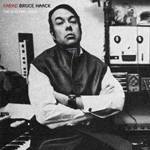|
|
 |
Dusted Reviews
Artist: Bruce Haack Album: Farad: The Electronic Voice Label: Stones Throw Review date: Jan. 28, 2011 |

|
|
|
 |
The monstrous growth of the internet has had many effects on the music industry, both good and (mainly) bad, but it’s hard to dispute that music fans have benefited tremendously. At no other point in history has so much music been available to those interested in finding it, and never has it been so easy to discover. As a result, even the most obscure artist from the past has a new chance to find an audience. In the old days, an album like Bruce Haack’s The Electric Lucifer, released in 1970, would have remained an item relegated to the more obscure corners of the music world, spoken of amongst clusters of fanatic collectors. Now, you can head to Amazon, listen to samples from The Electric Lucifer, Haackula (from 1978) and others, and via downloads have the full albums plus bonus material in a couple of minutes. This is most definitely a good thing, despite the occasional feeling that there was some fun in the searching that’s now gone.
The good news is that while a great many of the albums being unearthed now really would have been better off forgotten (never trust the words “long-lost classic”), most of Bruce Haack’s works are not among them. When he created his vocoder in 1969, he named it Farad after the brilliant 19th-century inventor Michael Faraday, and proceeded to use it on some of the oddest, most forward-looking albums of the ‘70s. Along the way he established stylistic elements still in use today by artists like Daft Punk and Black Moth Super Rainbow.
Spanning Haack’s career and focusing on the tracks emphasizing the vocoder, Farad: The Electric Voice includes a number of unreleased tracks, making it potentially worthwhile even to those already well-versed in his history. The songs do have a certain level of cheesiness, due both to the inevitability of technological progress (a.k.a. old drum machines) and to the lyrics, which weren’t poetry 35 years ago and haven’t become such since. But at their best, these songs evoke feelings of a long-lost science fiction future that has yet to come to pass, imbued with a somehow uneasy tinge. This sense of tense roboticism has informed the best electronic music, from Kraftwerk to Cabaret Voltaire to the Jonzun Crew, avoiding the sheen of pure plastic.
Not everything here is great, of course -- the tracks from Bite could have been left off with no regrets, for example. Nonetheless, Farad is more than simply an intriguing piece of musical history. If you’ve yet to stumble on Haack, you probably want to begin with The Electric Lucifer; but if you’ve got a curiosity about the vocoder, then this is for you. And when Haack’s treated voice intones “We’ll dance all night,” on the album’s synth-funky closing track “Party Machine,” you’ll smile.
By Mason Jones
|







